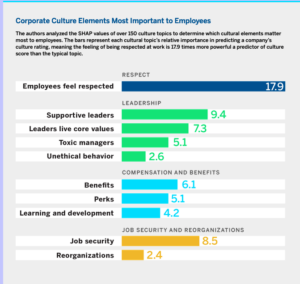When one thinks of company culture statements, phrases like “be human” or “create diversity” or “foster environments of innovation” might come to mind. A company or corporate culture is a set of values that guides and protects the decision-making framework of a company and its employees. It should be the first thing learned by a new employee and help enforce a standard of behavior for everyone. Interestingly enough, the brainstorming sessions that create company values often exclude the employees who are living it out. A recent article in MITSloan Review by cofounders Donald and Charles Sull of CultureX did a deep dive on how employees perceive corporate culture and came up with some pretty interesting observations. They analyzed 1.4 million employee reviews, separating out over 150 topics that helped identify which factors were most important in predicting a company’s overall culture score.
The chart above reflects their findings and guess what? Innovation and Social Responsibility, while important, didn’t even make the top ten. It was respect that topped the list by a landslide and in industries with a large number of front-line employees, there was an even stronger call for respect and a lot of negative feedback around it. Translation: Although most employees value feeling respected, the ones in industries where they face the public feel the least respected, and not necessarily by the people they serve but by their own company. Some companies, including Trader Joe’s and HEB, that are heavy on front-line employees manage to stand out for high levels of employee respect and overall strong cultural ratings so it isn’t a given that these industries have to accept high employee dissatisfaction. However, it does require an intentionality to rise above the norm in employee culture.
Alignment over Agreement
On a side note, there is some real wisdom in what Leap CEO Patrick Fingle recently had to say to the online magazine Technical.ly. He indicated that the key to his growth success is to understand the difference between alignment and agreement. Doubling his workforce over the past year, culture became more important than ever. He makes the point that while “agreement implies that each employee thinks the way a business is going about a certain strategy or task is exactly the right one, alignment is more about “understanding why it’s being done this way, and doing it to the best of their ability.”
Putting these two concepts of respect and culture alignment together makes sense. A company that does the heavy lifting of thinking deeply about and communicating the “why” to their employees rather than having a “do it because I said so” approach is miles ahead in the respect department. This “why we do what we do” approach also gives language to the front-line employees to use with the customer and that is empowering. Emphasizing alignment over agreement allows teams that may not agree on exact method to still work together effectively to reach the shared goal.
This Week’s To-Do
In a year where a record number of employees are quitting their jobs, it would serve companies well to step back and take an honest look at their company culture from the eyes of those who are most affected–the employees. Ask them what matters most to them at work and then engage them in the change process. Showing this level of respect can make a world of difference in creating a company culture that keeps its employees.
Let Gemsbok help you create your company culture statement. We lead sessions with all the shareholders in various settings and help craft a thoughtful corporate culture statement that reflects both the executive and non-executive experience. Contact us today!



